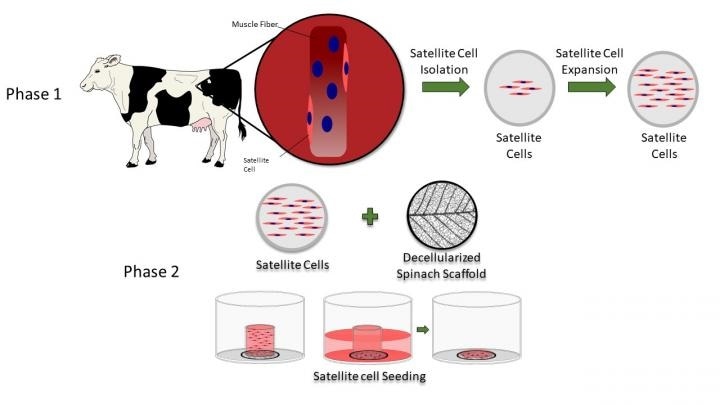A research team led by an engineer from Boston College has used spinach—a cost-effective and eco-friendly scaffold—as an edible platform to grow meat cells.

This diagram shows the steps Boston College and WPI researchers took to isolate and seed primary bovine satellite cells on a decellularized spinach leaf scaffold. Image Credit: Food Bioscience.
A new report published in the advanced online edition of the Food BioScience journal notes that this breakthrough could speed up the development of cultured meat.
When the circulatory network of a spinach leaf was stripped of all except its veiny skeleton, it successfully acted as an edible substrate on which the team grew bovine animal protein. According to Glenn Gaudette, lead author of the new study and a Professor of Engineering at Boston College, the findings could help scale up the production of cellular agriculture products to minimize environmental costs and satisfy the increasing demand.
Cellular agriculture has the potential to produce meat that replicates the structure of traditionally grown meat while minimizing the land and water requirements. We demonstrate that decellularizing spinach leaves can be used as an edible scaffold to grow bovine muscle cells as they develop into meat.”
Glenn Gaudette, Professor of Engineering, Boston College
Previous breakthroughs achieved by Gaudette, who is the inaugural chair of the new Engineering Department at Boston College, in this field gained worldwide attention.
In 2017, Gaudette and a multi-university group of researchers demonstrated that it is possible to cultivate human heart tissue on a spinach leaf scaffold, which was selected as it provided a natural circulatory system that is virtually impossible to duplicate with existing scientific tools and methods.
In our previous work, we demonstrated that spinach leaves could be used to create heart muscle patches. Instead of using spinach to regrow replacement human parts, this latest project demonstrates that we can use spinach to grow meat.”
Glenn Gaudette, Professor of Engineering, Boston College
Gaudette added that the group, including Worcester Polytechnic Institute graduate students Jordan Jones and Alex Rebello, removed the plant cells from the spinach leaf and used the left-out vascular framework to develop isolated cow precursor meat cells. The cells stayed viable for nearly 14 days and then differentiated into muscle mass.
We need environmentally and ethically friendly ways to grow meat in order to feed the growing population. We set out to see if we can use an edible scaffold to accomplish this. Muscle cells are anchorage dependent, meaning they need to grab on to something in order to grow. In the lab, we can use plastic tissue culture plates, but plastic is not edible.”
Glenn Gaudette, Professor of Engineering, Boston College
Gaudette’s study is supported by New Harvest. The team notes that the successful outcomes will result in further characterization of the materials and scientific processes to gain better insights into how to fulfill consumer demand and gauge how large-scale production could be achieved in compliance with health and safety guidelines.
“We need to scale this up by growing more cells on the leaves to create a thicker steak,” added Guadette. “In addition, we are looking at other vegetables and other animal and fish cells.”
Source:
Journal reference:
Jones, J. D., et al. (2020) Decellularized spinach: An edible scaffold for laboratory-grown meat. Food Bioscience. doi.org/10.1016/j.fbio.2021.100986.